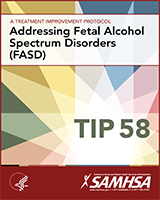NCBI Bookshelf. A service of the National Library of Medicine, National Institutes of Health.
Center for Substance Abuse Prevention (US). Addressing Fetal Alcohol Spectrum Disorders (FASD). Rockville (MD): Substance Abuse and Mental Health Services Administration (US); 2014. (Treatment Improvement Protocol (TIP) Series, No. 58.)
Giving Voice to a Hidden Population
- A woman gives birth to a child with a Fetal Alcohol Spectrum Disorder (FASD); no one told her that alcohol consumption during pregnancy could harm the baby.
- A man is repeatedly kicked out of various forms of treatment for noncompliance; he never means to be noncompliant, his special needs and lack of understanding are simply never recognized.
- A teen-aged girl doesn't receive appropriate screening for alcohol use during her pregnancy; her child is removed when she's identified with a substance use disorder, and her child is later found to have an FASD.
- A man repeatedly loses jobs because he can't “follow orders;” he ends up homeless and cycles repeatedly through the social service system.
These stories are not unusual. They are not “worst case scenarios.” They are the all-too-common realities of people with an FASD, or women who wanted to have a healthy child but weren't given the basic help they needed before and during pregnancy. And sometimes these realities overlap.
Addressing Fetal Alcohol Spectrum Disorders was written to help you offer hope to these individuals when they present in your setting. This TIP will not ask you to implement a whole new way of treating clients, although you may discover alternative approaches that you want to explore. Rather, it asks you to see people who have or may have an FASD as you see any individual in your care with a significant co-occurring life issue that should be recognized and incorporated into treatment planning. This TIP also asks you to see pregnant women who consume alcohol not through a lens of judgment but as women in need, for whom even a few minutes of information and education can make a lifetime of difference for their health and the health of their babies.
This TIP is also about hope for you as a substance abuse or mental health treatment professional because it gives you another way to view the clients who “just don't get it” or who seem to want to succeed in treatment but can't follow directions, don't make it to appointments, grow restless in group sessions, or generally seem “resistant” with no clear explanation. You can “reframe” your thinking about these clients. Not all of these cases will be explained by FASD, obviously, but making FASD awareness a part of the culture of your agency widens the net of understanding that you can offer to your clients and increases your staff's capabilities for achieving positive outcomes with a higher percentage of them.
Ultimately, SAMHSA's goal is to provide knowledge and assistance to help substance abuse and mental health treatment programs better serve their clients. Providing FASD-informed services is a part of that mission, and is the guiding principle behind the publication of this TIP. Thank you for taking the time to read this publication, and for potentially making a difference for a population that should not remain hidden any longer.
- Preface - Addressing Fetal Alcohol Spectrum Disorders (FASD)Preface - Addressing Fetal Alcohol Spectrum Disorders (FASD)
Your browsing activity is empty.
Activity recording is turned off.
See more...
